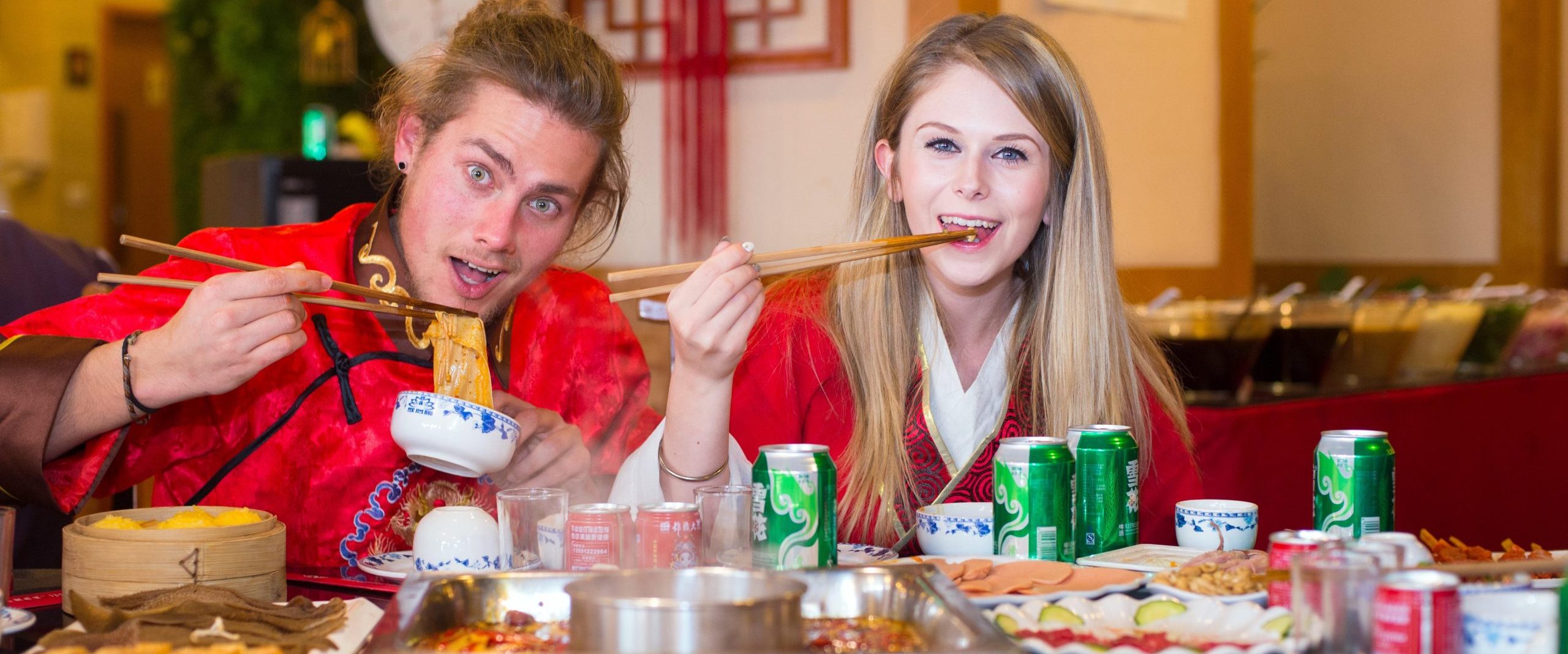Why does Sichuan Cuisine never fail to attract U.S. people?

On November 16, 2023, the 6th World Sichuan Cuisine Conference was held in Guang’an, Sichuan. During the conference, key executives from domestic and international companies, academicians in the food industry, industry experts, and company representatives engaged in dialogue and communication. They discussed Sichuan cuisine, evaluated Sichuan cuisine, and shared industry trends, with the aim of promoting the high-quality development of the Sichuan cuisine industry.
Let the world know and fall in love with Sichuan cuisine
As one of China’s eight major regional cuisines, Sichuan cuisine, with its scale and influence, leads the world. Through thousands of years of evolution, it has always adhered to the development philosophy of “inheritance without being conservative, innovation without forgetting its roots.” It gradually forms the classic characteristics of “clear and fresh, rich and mellow, numbing and spicy, aromatic and flavorful” dishes.
The World Sichuan Cuisine Conference, founded in 2018, aims to explore Sichuan cuisine and its culinary culture, gather global industry resources, tell the story of Sichuan cuisine, showcase the image of the Sichuan region, and promote innovative development in Chinese culinary culture. After six years of development, the World Sichuan Cuisine Conference has become a new platform for global Sichuan cuisine cultural communication and cooperation.
The 6th World Sichuan Cuisine Conference in 2023 consisted of four main sections: conferences, exhibitions, competitions, and tastings, covering various aspects of Sichuan cuisine, including its history, culture, and culinary techniques, showcasing the extensive and profound Sichuan cuisine.
One of the essences of Sichuan cuisine lies in its pursuit of novelty and evolution. While preserving the soul of Sichuan flavors, it incorporates the strengths of many different schools, capturing a myriad of tastes. Behind the preservation of this trait in Sichuan cuisine is the contribution of every Sichuan chef. Therefore, this edition of the Sichuan Cuisine Conference pays special attention to the comprehensive growth of Sichuan chefs. Under the platform of the “World Sichuan Cuisine Conference,” various competitions are created to encourage innovation among Sichuan chefs.
During the competitions, skilled Sichuan chefs blend traditional techniques with innovative elements, providing not only visual, olfactory, and gustatory delights but also showcasing the latest trends and high levels of culinary artistry in Sichuan cuisine.
Sichuan cuisine has become the largest regional cuisine in China
At the opening ceremony of the 6th Sichuan Cuisine Conference, the World Federation of Chinese Catering Industry, Unilever Food Planning, and Sichuan Tourism College jointly released the Research Report on the High-Quality Development of Sichuan Cuisine Industry (2023).
According to the report, as per the statistics from Unilever Food Planning’s Big Data Research Center, by the first half of 2023, the number of Sichuan cuisine restaurants has exceeded 320,000, surpassing the number of Cantonese cuisines, Jiangsu-Zhejiang cuisine, and other culinary styles. Sichuan cuisine has become the largest culinary style in the country. Chengdu-Chongqing area is the stronghold of Sichuan cuisine, and the number of Sichuan cuisine restaurants in cities like Shanghai, Beijing, and Shenzhen has been increasing year by year.
In addition, the Sichuan cuisine industry has achieved significant results in cultural heritage and innovation. In June 2021, Sichuan cuisine culinary skills were included in the fifth batch of the National Intangible Cultural Heritage representative project list, marking a new chapter in the cultural inheritance of Sichuan cuisine. Currently, Sichuan has a total of 47 “China Time-Honored Brands”, including 44 in the catering industry, accounting for 93.6%, and 125 “Sichuan Time-Honored Brands”, including 107 in the catering industry, accounting for 85.6%.
The report also points out that according to the statistics from Unilever Food Planning’s Big Data Research Center, consumers born in the 1990s and 1995s have become the main consumer force. The proportion of their daily dining consumption continuously increases reaching nearly 70%. In China, innovative fusion dishes combining Chinese and Western elements are highly favored by young consumers, with sales growth exceeding 50%. Spiciness has become the favorite taste for consumers born in the 1980s, and flavors like numbingly spicy, fragrant spicy, and Sichuan peppercorn have become the most beloved flavor profiles of Sichuan cuisine. It provides flavor guidance for the development of innovative Sichuan cuisine dishes.
International and Domestic Celebrities Contributing to the High-quality Development of Sichuan Cuisine Industry
“Sichuan cuisine does not refer to the dishes from Sichuan, nor the dishes that influence Sichuan, and it is not limited to what Sichuan people eat.” During the event, Li Houqiang, Vice Director of the decision-making Advisory Committee of the Sichuan Provincial Party Committee and provincial government, professor at the Sichuan Academy of Social Sciences, and doctoral supervisor, explained in his speech that Sichuan cuisine refers to the cuisine originated in the Sichuan Basin. The Sichuan Basin is its birthplace and native land, but it does not mean that it is solely produced and sold in Sichuan.
At the end of the event, founders and chairpersons of major catering enterprises from home and abroad joined the culinary masterclass. They summarized their experiences based on their own company and discussed the future trends of the Sichuan cuisine industry.
“The essence of Sichuan cuisine lies in seasoning.” Huang Weizhong, Regional Sales Director of Unilever, expressed his hope to leverage their ability to understand industry trends and customer demands. They aim to help the Sichuan cuisine industry establish a sustainable development ecosystem and consolidate its market position.
Regarding the prominent problem of homogeneity in Sichuan cuisine restaurants, Xu Fan, founder of Xujiacai, believes that Sichuan cuisine is a vast culinary system. To run a Sichuan cuisine restaurant successfully, one must first master the flavor profile. While learning and drawing inspiration, one must avoid plagiarism and strive for differentiation to maintain the core competitiveness of their own restaurant.
When discussing how overseas Sichuan cuisine restaurants can thrive in the long term, Hu Xiaojun, Chairman of Lao Sze Chuan Restaurant Group in the United States, shared his experience. He pointed out that the primary customers of overseas Chinese restaurants are foreigners, and they tend to be more conservative in their food choices. Therefore, he believes that the basic requirements for opening a restaurant overseas are: stability with innovation in dishes and thoughtfulness with enthusiasm in service. By achieving these two points, Sichuan cuisine restaurants can have better development overseas.
Guang’an has inherited the essence of Ba-Shu cuisines, forming its own unique style of Sichuan cuisine after centuries of inheritance and innovation. This conference held in Guang’an is not only an important opportunity for the development of the Sichuan cuisine industry in Guang’an City but also a significant platform for promoting international exchanges and inheritance of Chinese culinary culture.





